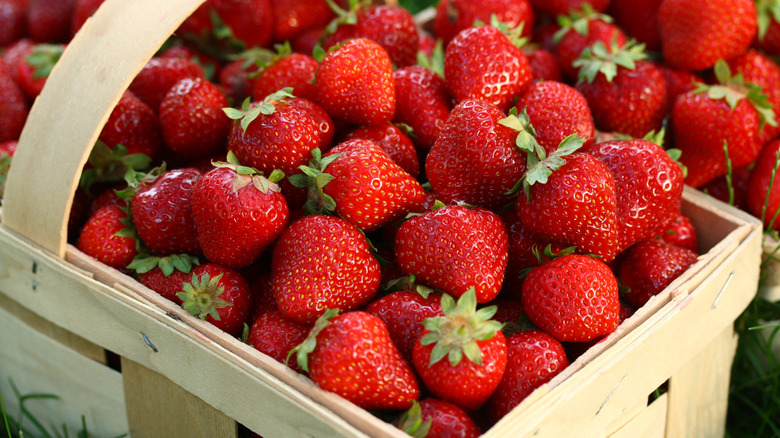Why You Should Wait To Wash Strawberries Until You're Ready To Eat Them
Nothing beats a fresh carton of strawberries from the farmer's market during peak season (around mid-June). Probably the sweetest of the berries, fresh, in-season strawberries can be used in smoothies, breads, parfaits, pastries, and more. Alternatively, when sublimely ripe, they're good enough to eat straight out of the carton. But those of us who like to wash produce as soon as we bring it home might want to think twice about doing that with strawberries. In this case, your best intentions will work against you.
Strawberries can be compromised by introducing moisture too soon. Washing them and storing them in the fridge shortens their shelf life, and can result in mold. If you want to eat your strawberries immediately, then go ahead and wash them, but as soon as you do the clock starts ticking on their freshness. Strawberries are quite delicate; their little seed pockets are perfectly suited for moisture trapping; adding additional moisture can cause the flesh to wilt and become moldy in a matter of days.
Menacing moisture
Moisture is the enemy when it comes to storing berries. Strawberries specifically can harbor more dampness than other types of fruit because their skin is full of tiny holes, so it's important to store them correctly for optimum freshness. It might be tempting to wash and cut strawberries for ease and access — and, let's be honest, aesthetics too: what's more appealing than opening a fridge full of freshly cut, brightly colored fruit in little storage containers? But unless you plan on scarfing pounds of strawberries in one go, resist the temptation.
Instead, keep your unwashed strawberries in an air-tight container. You can place a paper towel in with the berries to help soak up any excess moisture. It's important to know that even unwashed, immaculate, dry strawberries only survive in the fridge for about four or five days before they start to turn. And if you have a sneaky little mushy one hiding at the bottom of the carton, primed to spoil the bunch — root it out. Worst case: if your strawberries do go soft they can always be turned into a puree or dried out as a nice fruit leather.
How to wash strawberries
If you are planning to use your strawberries within a day or two, consider washing them in a vinegar solution. This will not only get the berries clean, the acid will help preserve their freshness slightly longer than water alone. For every three cups of water, add one cup of white or apple cider vinegar to your soak and submerge the strawberries for between five and 20 minutes. This process depends on how many strawberries you have; the larger the quantity the longer they may need to soak. After soaking, rinse the strawberries well to remove the vinegar flavor.
You might be wondering about bugs in your berries. Sure, you can wash your strawberries in salt water and watch all the little fruit fly larvae wiggle their way out — as TikTok helpfully brought to our attention. But doing this will also make your strawberries taste weird. Those bugs you might be worried about? You've been eating them as long as you've been eating berries. The tiny larvae are not harmful, so skip the salt water and enjoy your delicious strawberries.


